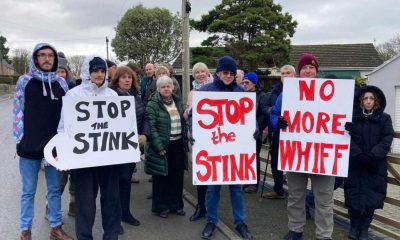Farming
Eggciting times continue for Welshpool farming family

THE UNCERTAINTY created by Brexit and a desire to see the family farm succeed for years to come led one Welshpool farming family to make a feathery change.
Farmers’ Union of Wales members Mark and Helen Williams, who farm 40 suckler cows and 900 ewes at Pen Y Derw, near Welshpool, decided to diversify into egg production and have been up-and-running since June this year.
The poultry unit, which is home to 16,000 free range hens, provides the family with an additional income, as well as offering extra part time employment in the area.
“We have looked at poultry farming for the last ten years and the uncertainty created by Brexit, bearing in mind that most of our income has been provided by lamb trade and farm support payments, gave us the push we needed to make the decision and get the ball rolling,” said Mark Williams.
The planning process started in early 2015 and after lots of drawings, surveys and modelling, planning was granted in November 2015.
“Egg production is mainly a domestic market, so that takes the fear of having to export away. Originally we thought we would be going into broiler chickens but when researching the market a contract was difficult to find. The final thing that made us decide were our 3 boys. We are expanding the business to accommodate them if they wish to take over the farm in the future,” added Mark.
The eggs produced at Pen Y Derw are sold to L J Fairburns & Son, who collect them to be processed (graded) and packed, and they are then sent to distribution centres and onto supermarket shelves.
The chickens produce between 14,500 – 15,500 eggs every day, and Helen is in the chicken shed by 6.30am to check the birds, before heading back to house by 7.30 to make the boys their breakfast and do the school run.
Then its back to the chicken shed to start packing eggs by 9am, which takes about three hours.
By around 5pm Helen makes her way back to shed to do the final walk around and check the hens are ok.
Talking about her new routine she said: “I have to fit things in around the boys where possible and the mornings are now taken up with the hens.
“Before I had time to do other jobs, such as housework, banking, paperwork etc. so the pace here has definitely changed. Looking after the chickens is not so heavy and physical as looking after the sheep and cattle and it’s work in a dry and warmish environment.”
Walking around the chicken shed, Mark explains the production process: “The hens lay their eggs in nest boxes. Then the eggs roll onto the egg belts, which take them onto a cross conveyor and into the packing room.
“Here they are graded by hand, go through the machine to be stamped and put in trays. Then they go along a belt into a tray stacker, which stacks trays in sixes. Once we have a run of six stacks we put them on a pallet, which is a total of 720 dozen eggs. This is then wrapped and labeled and left in the cool room for collection,” he said.
Even though the couple have now got used to their new routine, it has not all been plain sailing from the start. Helen explains: “The birds arrived in a really hot week in June and they weren’t eating or drinking enough to start, although they were still gaining weight.
“That was a bit of a worry for us but thanks to the support from Lloyds animal feed we managed to get everything sorted. We also had a few very minor teething problems with the equipment but now everything is running well. With all the eggs our hens are producing we look forward to lots of cake here at home and a reduced fertiliser bill.”
But do the couple think they have made the right decision 4 months into their new way of life?
“We are still learning and it has changed our life quite a bit, maybe ask us again in 12 months time,” laughs Helen.
Having visited the farm and seen the new chicken shed in action recently, FUW County Executive Officer Emyr Davies said: “Mark and Helen are a credit to our industry. Their enthusiasm and dedication to give their farming business a chance of survival in light of the uncertainty created by Brexit is really an inspiration.
“Of course, this sort of diversification doesn’t suit everyone and there are often stumbling blocks with regards to planning that hold many farm businesses back. I would urge those in charge of granting planning permission to think again and not be the block that holds those farms back who want to future proof their business.”
Farming
Nut trial looks at viability of producing walnuts in West Wales
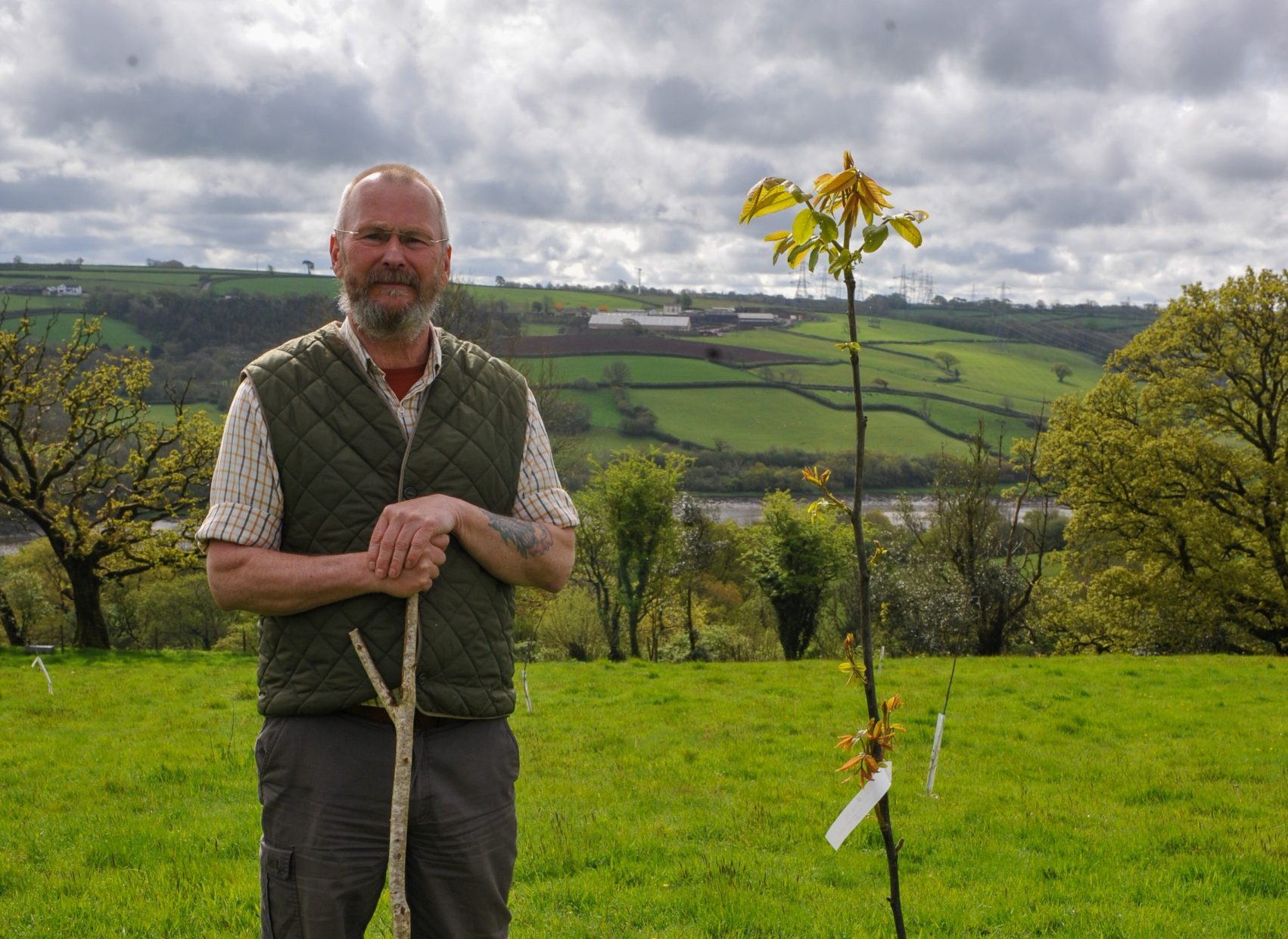
A WEST WALES couple are experimenting with growing nuts on their land.
Martyn Williams and Alison Harwood have planted walnut and sweet chestnut trees on a one-hectare south facing slope overlooking the River Towy.
They have chosen varieties that are a good match for conditions at Old Castle Farm, Llangain, Carmarthenshire.
Nuts are being grown commercially more than ever in the UK as the climate heats, making products more economically viable, but what is less understood is how well suited this enterprise is to weather conditions in west Wales, or the free-draining and slightly acidic loam soils at Old Castle Farm.
To examine this, Martyn and Alison have been awarded funding from the Farming Connect ‘Try Out Fund,’ an initiative that makes provides funding to individuals and groups of farmers and growers to experiment with ideas and bring them to life.
They have planted 20 walnut trees and 20 sweet chestnut trees, varieties selected for growth characteristics matched to the latitude in this region.
Establishment is now being monitored and, to give the trees the best chance to thrive, the area around them is being kept weed-free to prevent competition for nutrients and moisture.
The plan is to explore the use of alternative mulches, such as wool, even shells from a local beach, to balance the soil temperature and retain moisture.
Nut trees are helpful for providing biodiversity on farms but compared to other European regions, Wales has a very small economy in food production from trees.
Climate change coupled with proposed changes to the Welsh government farming policy means that alternative types of food production need to be investigated.
Martyn is grateful to Farming Connect and the Try Out Fund for helping to bring the project at Old Castle Farm to life.
“It has given us a bit of a free rein, taking the pressure off trialling an enterprise that might or might not be viable.’’
It is likely to be five years before the trees produce any quantity of nuts, if indeed they do, but Martyn says planting trees is as much a legacy for future generations as the pleasure they bring to the current one.
“I love planting trees, they could be around for hundreds of years, long after we have gone. I get that farmers need to produce food to feed us but this will be our legacy.’’
Farming
Welsh farmers urged to be vigilant for signs of Bluetongue
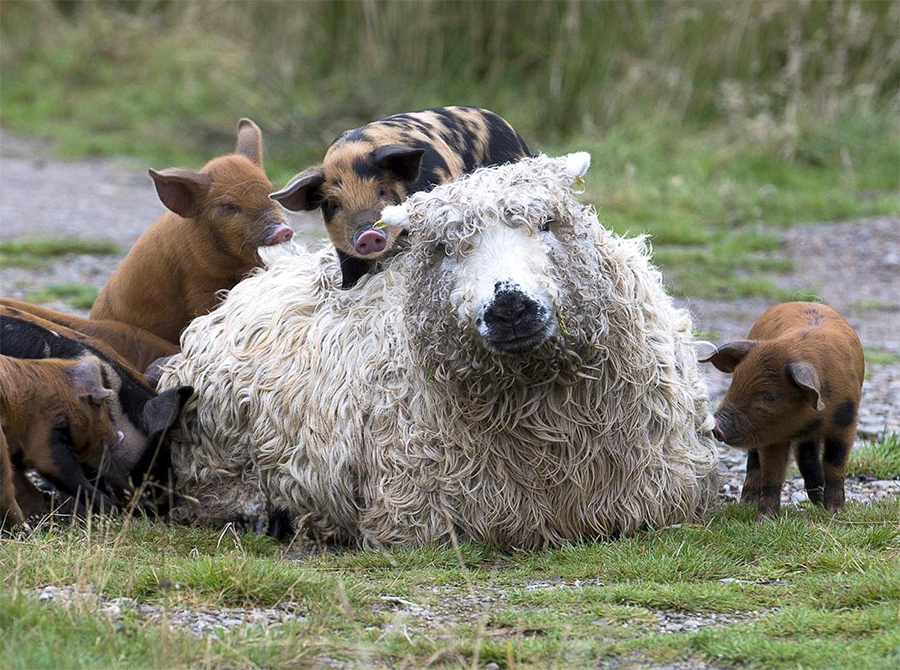
WALES’ Chief Veterinary Officer has urged farmers in Wales to be alert to signs of Bluetongue as we enter a period where animals are at an increased risk of contracting Bluetongue virus from midges.
Bluetongue does not affect people or food safety. The virus is primarily transmitted by midge bites and affects cattle, goats, sheep and camelids such as llamas, and midges are most active between April and November.
Bluetongue is a notifiable disease, so any suspect cases must be reported to the Animal and Plant Health Agency (APHA).
The impacts on susceptible animals can vary greatly – some show no clinical signs or effects at all, for others it can cause productivity issues such as reduced milk yield or reproductive losses, while in the most severe cases can be fatal for infected animals.
Farmers can help prevent the disease by:
- responsibly source livestock
- practicing good biosecurityon your premises
- remaining vigilant
Keepers considering importing animals or biological products, for example germinal products , from BTV affected countries or out of disease control zones should consult their vet to check if this is permitted, and on the risks of doing so. This should always be done before deciding to import or move animals.
All businesses should have a contingency plan for both responding to disease outbreaks on their premises and if they might be in a disease control zone. Contingency plans should include details of where animals are normally slaughtered to check that abattoir is designated.
Richard Irvine, Wales’ Chief Veterinary Officer, said: “As we enter this period where animals are more at risk from Bluetongue from midges, I would urge all keepers to take action now to protect their herds and flocks to keep disease out, be aware of how to spot Bluetongue and report any suspected cases immediately”.
“Wales has never had a case of Bluetongue – but – with past cases in England and in Europe we are encouraging people to be vigilant and prepared for Bluetongue to strike again.”
Your local Animal and Plant Health Agency (APHA) office should be contacted immediately on 0300 303 8268 if you suspect Bluetongue in your animals. APHA vets will investigate suspected cases.
Further information and resources on the current bluetongue situation are also available on the Ruminant Health and Welfare website.
Farming
Langdon Mill Farm lodges plans for big new development

One of Pembrokeshire’s largest dairy farms, which has a 2,000-strong dairy herd, has submitted a scheme for new calf buildings to “reduce reliance on third-party farms”.
Hugh James of Langdon Mill Farms Ltd has applied for permission for a calf building and weaned calf building, and associated yard areas, at Langdon Mill Farm, near Jeffreyston, Kilgetty.
A supporting statement, through agent Reading Agricultural Consultants, said: “Langdon Mill Farm is a dairy unit extending to approximately 1,215ha, comprising 283ha owned land and 730ha rented, located approximately 1km north of the village of Jeffreyston.
“A further 162ha is used by the business to spread slurry under informal agreements. The holding currently has a milking herd of approximately 2,000 cows, which are housed indoors for the majority of the year, with dry cows [cows that are not lactating, prior to calving] and heifers grazed outdoors when weather and soil conditions permit.
“There has been significant investment in buildings and infrastructure at the farm over the last decade in respect of cattle accommodation, slurry storage, milking facilities, Anaerobic Digestion (AD) plant and feed storage. The unit is efficient, achieving yields of more than 10,000 litres/cow/year, with cows being milked three times/day in the 60-point rotary parlour.
“Langdon Mill Farm currently directly employs 21 full-time, and three part-time staff (including the applicants). Of these, four live on site in the two dwellings opposite the farm, with the remaining staff living in the locality.”
urrently, calves are reared at Langdon Mill Farm for two months before being transported off-site to be reared at a number of third-party farms in the area.
At 22 months the in-calf heifers are brought back to the maternity building to calve, and then are introduced into the milking herd.
The proposed 61.2m long calf building is required to accommodate young-stock, following separation from the cows, to two-months, with the 164.8m weaned calf building to be used for calves from two months to seven months. Following the construction of the new calf accommodation, the existing building would be used for machinery and straw storage.
Currently, weaned calves are transported by tractor and cattle trailer to be reared at a farm in Cresselly, approximately 2.4km from Langdon Mill Farm.
The application says the proposals would “clearly make the enterprise more financially robust by reducing reliance on third party farms,” adding: “Despite the scale of the new buildings, their relationship to the existing dry cow/maternity building and proposed anaerobic digestion plant would ensure that landscape impact associated with the proposed development would not be significant.”
The application will be considered by planners at a later date.
-

 News6 days ago
News6 days agoBeautiful, funny and lovely: Family pay tribute to Sian Batchelor
-
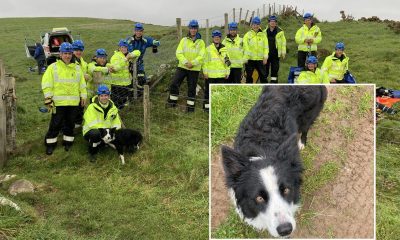
 Community2 days ago
Community2 days agoJoy as Willow rescued by coastguard after 12-day ordeal
-

 Community6 hours ago
Community6 hours agoTragic passing Josh, 28, mourned by Milford Haven community
-

 Community2 hours ago
Community2 hours agoLucy’s sudden passing at just 38 leaves a community in mourning
-
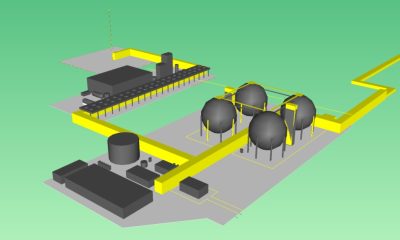
 Business3 days ago
Business3 days agoDragon LNG explores integration of LNG and CO2 liquefaction processes
-

 News5 days ago
News5 days agoBody recovered confirmed to be Luke Stephenson, say police
-

 News7 days ago
News7 days agoTigers second division Cup Champions
-

 News2 days ago
News2 days agoMilford Haven RFC celebrates Mini’s Section Presentation






















